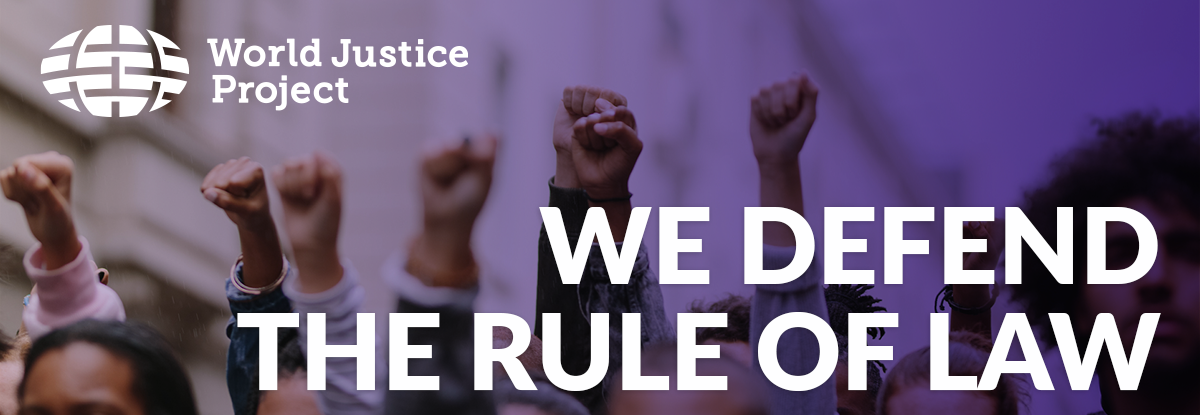

The 2022 WJP Rule of Law Index recorded the fifth consecutive year of rule of law declines driven by stark authoritarian trends. News outlets in over 100 countries took note in more than 2,000 stories.
When Hong Kong convicted two protesters of sedition, journalists pressed officials about Hong Kong’s fallen ranking in the new Index. When The New York Times wrote about threats to U.S. election integrity, it quoted WJP Executive Director Elizabeth Andersen on how rule of law trends have weakened democracy. Meanwhile, The Economist used Index data to contrast Russia with some of its reform-minded neighbors, and CNN en Español dug into Latin American findings.
Officials from Kosovo, Rwanda, Georgia, the United States, Philippines, Uzbekistan, the European Parliament, and multinational corporations cited Index data as a critical benchmark in their work.
Our experts have provided briefings to private sector leaders and officials of the European Union, OECD, Council of Europe; UNDP, and the governments of Hong Kong, DRC, Kazakhstan, Honduras, and Thailand (to name a few), all of which use the WJP Index data as a policy-making reference point. Public WJP events convened stakeholders in Brazil, the United States, and Asia Pacific for expert discussion of the Index data and their implications for reform efforts.
MEXICAN SUPREME COURT FREES WRONGFULLY CONVICTED MEN

Last year, a Netflix series that grew out of WJP research followed the nightmarish case of three men wrongfully convicted and sentenced to 50 years for attempted kidnapping. Just last week, the Mexican Supreme Court overturned the convictions and reinvigorated the presumption of innocence in Mexico’s criminal justice system.
IDENTIFYING RULE OF LAW PRIORITIES IN ASIA PACIFIC

In Asia Pacific, the WJP is building partnerships to advance dialogue and action on the region’s most pressing rule of law issues. Drawing on our data, research, and extensive stakeholder consultation, WJP has identified three critical priorities in Asia Pacific:
-
Defending judicial independence
-
Safeguarding the free flow of information
-
Strengthening access to justice for minorities.
These issues were front and center at our December 8-9 Asia Pacific Justice Forum, which convened dozens of leaders from across the region and diverse sectors in Jakarta for two days of workshops, good practices presentations, and interactive panel discussions. The event assumed particular urgency in light of 2022 Index revelations that 71% of Asia Pacific countries are backsliding on rule of law.
WORLD JUSTICE FORUM 2022 FORGES GLOBAL ACTION AGENDA

Ministers of justice from around the world, the United Nations Development Programme, and an international coalition of whistleblowers were among the many groups to advance major rule of law initiatives at the World Justice Forum 2022: Building More Just Communities (May 31-June 3).
More than 1,200 attendees from 116 countries gathered in The Hague to collaborate and set the action agenda on the Forum’s three themes:
-
Anti-corruption and open government
-
Equal rights and non-discrimination
-
Access to justice
In the Forum’s final statement, WJP and its co-producing partners called upon leaders “to actively defend and advance universal principles of fair and accountable governance and fundamental rights” ahead of the 2023 Sustainable Development Goals Summit.
SUPPORTING FRONTLINE RULE OF LAW ADVOCATES

At the Forum, 40 World Justice Challenge finalists and honorable mentions presented their groundbreaking rule of law projects from around the world, benefited from a week of networking and learning, and competed for $100,000 in prizes.
“The Justice Expo was not a showcase of proposals, suggestions, or hypotheses,” wrote finalist Patrice Sutton of DC Justice Lab. “It was an inventors’ forum: a spectacular display of evidence that dramatic change and global healing are achievable through innovation.”
In 2023, we plan to keep building and expanding the Challenge network of visionary grassroots changemakers, who together can accelerate their impact globally.
CATALYZING REFORMS IN MEXICO

Since launching the fourth annual WJP Mexico States Rule of Law Index in the Mexican Senate in May, our experts have been traveling around the country to support state-level uptake and action on the findings. Presenting our data and analysis to high-level audiences including governors, state legislators, judges, and anti-corruption officials has paid off.
Nineteen of Mexico’s 32 states are now using Index data to shape reforms and track progress, and we expect more to follow suit.
Next year, WJP will build on our success and launch a new “Open Justice Metric” in collaboration with Mexico’s National Transparency Institute. Stay tuned to see how we evaluate the transparency, accountability, and responsiveness of federal and state-level justice institutions.
TACKLING THE DATA GAP TO CLOSE THE JUSTICE GAP

To address the global justice gap of 5 billion people, WJP champions a data-driven focus on people and their needs, rather than institutions.
In 2022, we gathered the growing people-centered justice movement at the World Justice Forum, and USAID cited WJP research when announcing its new people-centered approach to rule of law promotion.
We sounded the alarm that global progress on civil and criminal justice has stagnated in a new SDG 16 Data Initiative report, and we called for a redoubling of efforts to meet the globally adopted goal of access to justice for all by 2030.
As a member of the Ibero-American Alliance for Access to Justice, we’re assessing justice needs and data collection in the region to help countries shape new commitments to people-centered justice.
And we’re leveraging our own country-level justice survey data, too, most recently holding focus groups with judicial experts and practicing attorneys in Paraguay. The learnings—including when people seek justice, how they perceive corruption in the justice system, and the traits they find the most helpful in an attorney—will help strengthen legal education and services in the country.

After we produced five rule of law reports on Central American countries this year, U.S. Congressman Joaquin Castro cited them in his call to address the root causes of migration.
In 2023, we’ll return to those five countries to see what’s changed, and we’ll analyze our new polling throughout Latin American and the Caribbean for a total of 27 new country reports.
We’re also preparing a special report on corruption in the Caribbean that will break new ground on investigating graft in small states.
Watch for new rule of law impact in the United States, too. WJP Co-founder and Board Chair William Hubbard recently announced our new U.S.-focused campaign to “Rebuild Trust.”






